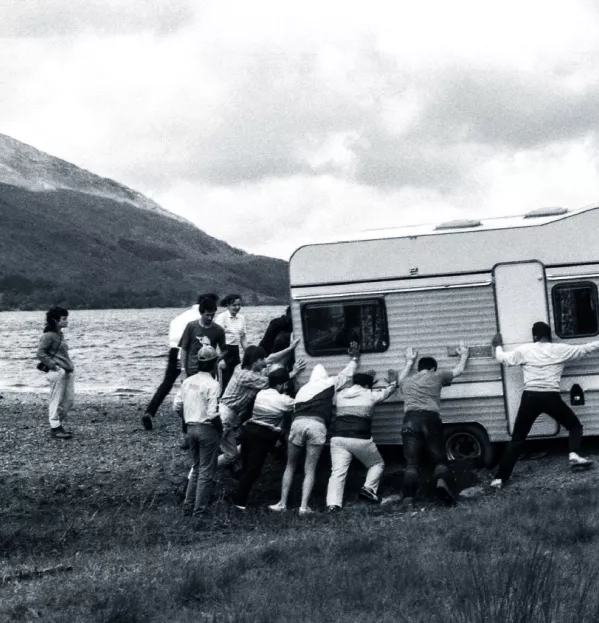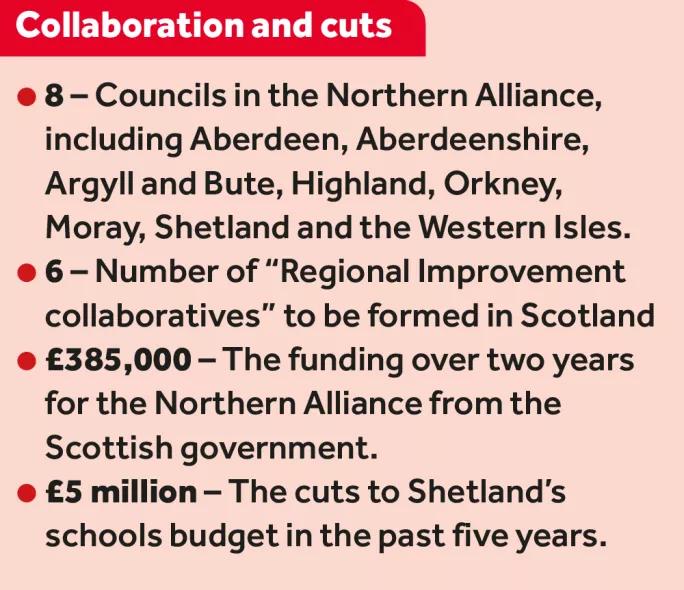‘The regions can give schools a push - if they get proper funding’

In August 2015, six councils in the North East of Scotland held a summit in a bid to shine a light on the problems they were having recruiting and retaining teachers - and come up with solutions. Since then, the relationship between the authorities has blossomed. The so-called Northern Alliance is the result.
Now every council in Scotland is to be part of one of six regional groupings for education - as announced by the government last month - and the Northern Alliance is regularly held up by education secretary John Swinney as an example of best practice. So how have these local authorities made it work?
The Northern Alliance - which now includes eight councils, thanks to Western Isles joining after the summit and the addition of Argyll and Bute - is “a coalition of the willing”, says Gayle Gorman, director of education and children’s services in Aberdeen, who, since being interviewed by Tes Scotland, has been seconded to lead the alliance.
It grew up “organically”, says Ms Gorman, starting out as a response to a shared problem - teacher shortages - and evolving into a group of directors coming together to discuss common issues. “From that we began to look at what was working well in our own areas and we started to share,” she adds.
Challenges shared
This has led, for instance, to Highland Council’s approach to driving up attainment in literacy being rolled out across the Northern Alliance authorities. This year half of the schools in each of the first seven alliance councils will be involved. The project ensures that whether a child grows up in Peterhead or Kirkwall, they will get the same firm foundation to build on as they learn to read and write, says James Cook, the primary depute headteacher seconded to the Northern Alliance to lead the project.
This chimes with what the education secretary has argued when making the case for collaboratives.

However, Mr Swinney has had to step back from his plans for the bodies to be run by regional directors appointed by the schools inspectorate, Education Scotland, amid fears that would result in “no meaningful local democratic accountability for education in Scotland”. Instead council leaders will appoint the regional “lead officer” or “coordinator”.
Ms Gorman estimates the literacy project is one of around 20 running across the Northern Alliance. She believes that the challenges the authorities share in terms of “geography and distance” have provided the glue that holds them together. The alliance covers around 55 per cent of the land mass of Scotland and includes more than 80 inhabited islands. However, having a clear governance structure has also been important, she says. The directors provide the strategic leadership for the alliance and a recently formed “convention of conveners” ensures “democratic accountability”.
The risk of ‘under-resourcing’
There is also an “improvement advisory forum” comprised of academics and representatives from national bodies, like Education Scotland and the Scottish College for Educational Leadership, which provides “challenge” to the alliance, says Ms Gorman. George Smith is the chair of the convention of conveners and also of Shetland Islands Council’s education and families committee. He praises the directors for “seeing opportunity where there was difficulty” and creating the alliance, saying that it brings real benefits.
However, he warns that the success of all the new improvement collaboratives, including the Northern Alliance, will depend upon adequate government investment - echoing comments made by the general secretary of the EIS teaching union, Larry Flanagan. The post of collaborative lead should be funded centrally, says Mr Smith. Currently, Ms Gorman’s work for the Northern Alliance is funded by the Scottish government - it gave the alliance £385,000 earlier this year to further develop “collaborative working infrastructure” and help fund the literacy project and a numeracy project. However, that cash only pays for two days of Ms Gorman’s time and will run out in two years’ time.
Mr Smith says: “The Scottish government needs to think through how these bodies are going to be resourced and not expect that this will just be another cost absorbed by each local authority. If anything puts them in difficulty, it will be under-resourcing.”
However, under questioning from MSPs in the Scottish Parliament last month, Mr Swinney appeared to rule out upfront funding for collaboratives, saying “budgetary pressures” would be assessed as collaboratives begin to “formulate their plans about the scale of their activities and the areas of activity”.
A Scottish government spokeswoman said: “Regional Improvement Collaboratives will be resourced by pooling and sharing local government resource and developing Education Scotland staff time and expertise. Any additional resource would be considered as part of the normal budgetary processes.”
You need a Tes subscription to read this article
Subscribe now to read this article and get other subscriber-only content:
- Unlimited access to all Tes magazine content
- Exclusive subscriber-only stories
- Award-winning email newsletters
Already a subscriber? Log in
You need a subscription to read this article
Subscribe now to read this article and get other subscriber-only content, including:
- Unlimited access to all Tes magazine content
- Exclusive subscriber-only stories
- Award-winning email newsletters